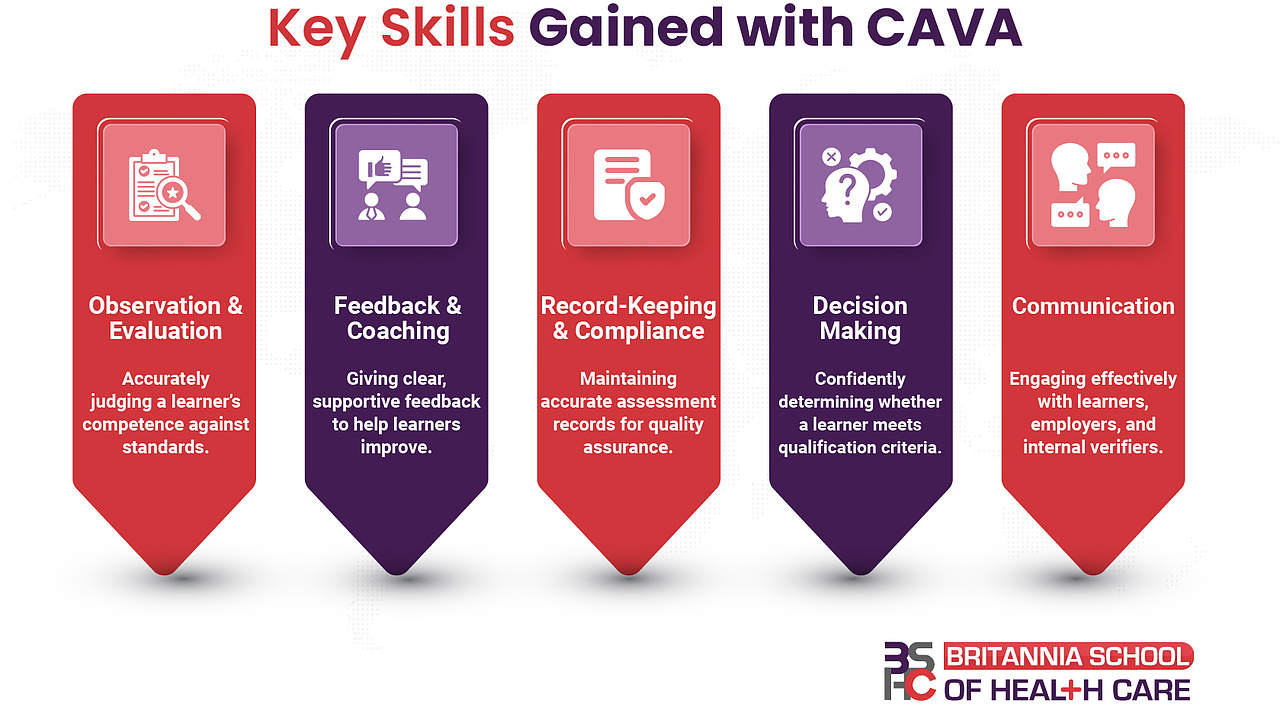The Level 3 Certificate in Assessing Vocational Achievement (CAVA) is a nationally recognised UK qualification for individuals looking to become qualified assessors in vocational education and training. Often known as TAQA, it replaces the older A1/A2 and D32/33 awards, offering up-to-date training for assessors working across vocational and work-based learning environments, ensuring quality and consistency in assessment practices.
Why Choose the CAVA Qualification for Vocational Assessing?
It is the most comprehensive assessor qualification at Level 3 and equips learners to assess both occupational competence in the workplace and vocational knowledge in learning environments. Whether you are working in further education, adult learning, apprenticeships, or workplace training, this course prepares you to carry out fair, accurate, and supportive assessment that meets national standards and supports learner progression.
What is the Role of the CAVA Qualification?
The CAVA (Level 3 Certificate in Assessing Vocational Achievement) plays a vital role in the UK’s education and training sector, particularly within vocational and workplace learning environments. The primary role of the CAVA qualification is to equip individuals with the knowledge and practical skills needed to assess learners’ performance and knowledge in both work-based and classroom-based settings. This includes assessing a learner’s ability to meet occupational standards and achieve learning outcomes as set by awarding organisations.
Professionals who hold a CAVA qualification are authorised to:
- Conduct fair and accurate assessments of vocational learners.
- Evaluate portfolios of evidence, direct observations, and professional discussions.
- Ensure assessments align with regulatory and awarding body requirements.
- Provide constructive feedback to support learner progression.
Who Can Take the CAVA Qualification?
The CAVA is especially relevant for those assessing NVQs, apprenticeships, diplomas, or in-house training programmes. This qualification is suitable for individuals who:
✅Want to become assessors in their field of expertise.
✅Currently support learners or apprentices in vocational subjects.
✅Work in training, teaching, coaching, or assessing roles.
✅Are looking to formalise their assessor skills and gain a nationally recognised qualification.
✅Are 19+ and have occupational competence in the area they wish to assess.
What are the Practical Requirements for CAVA?
Learners must have access a real work or training environment. Practical assessments include:
- Assess Two Learners: You must assess at least two learners in a real work environment.
- Use Diverse Methods: Apply assessment methods, such as observation, questioning, work products, or professional discussions.
- Work Product: Submit assessment plans, observation records, feedback forms, and learner progress reviews.
How Long does it Take to Complete the CAVA?
The qualification typically takes 2 to 4 months to complete, depending on how quickly learners gather evidence and complete assessments. It is a flexible course often delivered online making it accessible to full-time workers.
What Career Paths can You Follow after the CAVA?
The Level 3 Certificate in Assessing Vocational Achievement opens the door to a variety of roles in education and training,and workplace sectors. Common career paths include:
- Qualified Assessor – Assess learners in apprenticeships, NVQs, and vocational courses.
- Workplace Trainer – Deliver and assess training within organisations or industry settings.
- Internal Quality Assurer (IQA) – With further training, progress to verifying assessment decisions and maintaining quality standards.
- FE or Adult Education Tutor – Combine assessing with teaching in colleges or adult learning environments (often alongside a teaching qualification).
- Apprenticeship Coach or Reviewer – Support and assess apprentices throughout their learning journey.

Why Employers Value CAVA-Certified Assessors?
CAVA-certified assessors are highly regarded across the education and training sector because they bring both credibility and competence to vocational assessment. Their structured approach to evaluating learner performance ensures fair, consistent, and high-quality assessments, which directly supports learner achievement and institutional success. Employers and training providers value CAVA-qualified professionals because they:
- Improve learner success rates with structured, fair assessments.
- Reduce risk for training centres by ensuring compliance.
- Bridge the gap between education and industry with real-world evaluation skills.
Case Study: Supporting Skills in the Workplace
Meet Eva:
Eva is a qualified chef with 15 years of experience. After supporting junior staff in training, she decided to take the CAVA qualification. During the course, she assessed two learners in a catering apprenticeship, using observation, questioning, and professional discussion. She created detailed feedback reports and contributed to learner progress reviews.
How Did the Course Help?

Gave her confidence in planning and delivering structured assessments

Helped her meet Ofsted and awarding body requirements

Enabled her to become an official assessor in her workplace training programme

Inspired her to pursue the Level 4 Certificate in Education & Training next
Conclusion
Earning the Level 3 Certificate in Assessing Vocational Achievement (CAVA) is not just about meeting industry standards, it is about unlocking your potential as an education professional. With the skills to assess fairly, confidently, and competently, you will play a key role in shaping learner success. Whether you are guiding apprentices, leading workplace training, or contributing to vocational education, CAVA sets the stage for a career with real impact and lasting value.


